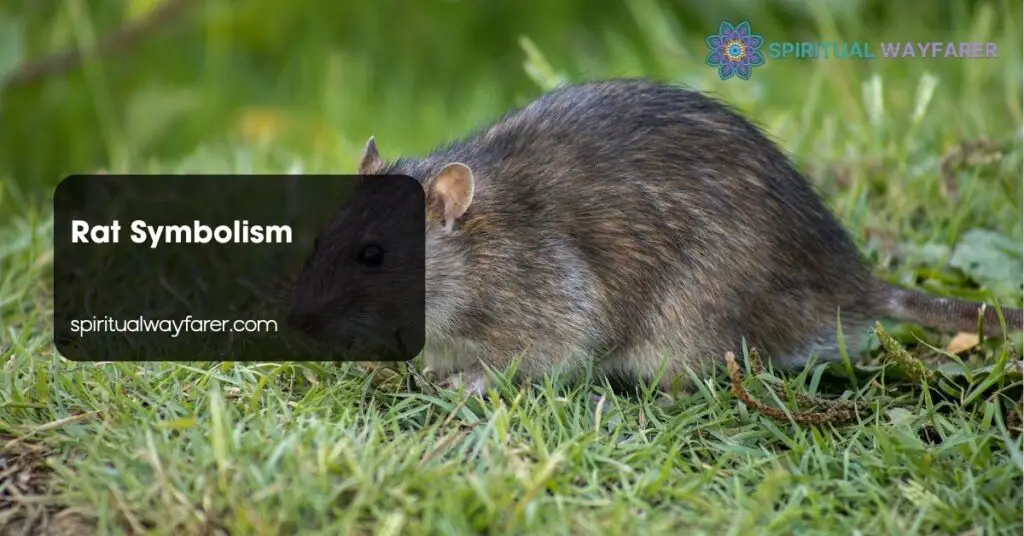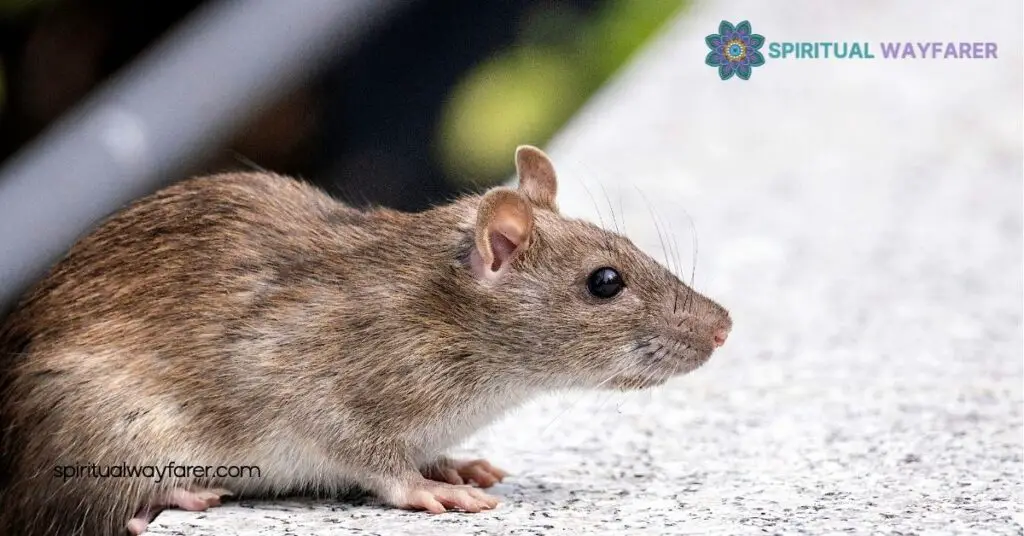Rats often carry a stigma, but their symbolism runs deep across various cultures. We explore how these intelligent creatures embody resilience and adaptability, traits that resonate with our own experiences. Understanding rat symbolism can unlock new perspectives on overcoming challenges and embracing change.
From ancient folklore to modern interpretations, rats represent more than just survival—they symbolize creativity and resourcefulness. Join us as we investigate into the rich meanings behind rat symbolism and discover how these tiny animals can inspire big transformations in our lives.
Related Posts:
- Unveiling Rat Symbolism: Surprising Meanings Across Cultures
- Dead Rat Symbolism: 9 Surprising Meanings From Ancient Myths to Modern Dreams
- Dead Deer Symbolism: Unveiling the Powerful Meanings Behind This Sacred Messenger
Historical Significance Of Rats
Rats have significantly influenced human societies throughout history. Their interactions with various civilizations highlight their adaptability and importance.
Rats In Ancient Civilizations
We observe that in ancient Egypt, rats symbolized fertility and protection. Hindu traditions associate rats with Lord Ganesha, embodying intelligence and resourcefulness. Also, in Greek and Roman cultures, rats were recognized for their resilience, often appearing in myths and daily life.
Evolution Of Rat Symbolism
The symbolism of rats has evolved over time, reflecting changing human perspectives. Originally revered in some cultures, rats now represent a mix of traits including disease and survival. This shift mirrors our ongoing relationship with these adaptable animals, balancing negative and positive connotations.
Cultural Interpretations
Rats embody various symbolic meanings across cultures, reflecting unique values and beliefs.
Eastern Perspectives
In Eastern cultures, especially within Asian traditions, rats represent positive attributes and hold important symbolism.
- Chinese Culture: The rat leads the Chinese zodiac, symbolizing intelligence, resourcefulness, and wealth. It signifies good fortune and prosperity, linking to traits such as wisdom and industry. Due to their rapid reproduction, rats also represent fertility and abundance.
- Japanese Culture: Japanese folklore and Shintoism associate rats with Daikoku, one of the Seven Lucky Gods. They symbolize abundance and prosperity, embodying industry and intellect.
- Hindu Culture: In Hindu mythology, the rat is linked to Lord Ganesha, the remover of obstacles. It stands for wisdom and intelligence.
Western Perspectives
In Western cultures, rats often carry more negative connotations but also hold nuanced meanings.
- Folklore and Literature: Rats frequently symbolize deceit and uncleanliness. But, they also represent survival and adaptability in challenging environments.
- Symbolism in Art: Artists use rats to depict themes of decay, disease, or the darker aspects of human nature. Alternatively, they can symbolize perseverance and resilience.
- Modern Interpretations: In contemporary media, rats appear as clever and resourceful characters, challenging traditional negative stereotypes and highlighting their intelligence.
Psychological Symbolism
Shadow and the Unconscious
We recognize rats as symbols of the shadow aspect of the human psyche. In Jungian analysis, they represent parts we reject or hide, such as unsavory instincts and desires. For example, the Pied Piper story illustrates that banishing these shadow elements can lead to losing other valuable aspects like potential and future hopes[^1].
Freudian Interpretations
Freud interpreted rats as phallic symbols and analogues for unclean children. This association connects rats to biting, wailing, and shouting, reflecting primal behaviors and the unconscious mind[^3].
Resourcefulness and Adaptability
Rats also symbolize resourcefulness, intelligence, and survival. Their ability to adapt to various environments showcases these traits, highlighting resilience and cognitive skills.
[^1]: Reference Placeholder
Rats In Literature And Media
In literature and media, we often see rats as powerful symbols embodying various themes. They represent poverty, decay, and disease. Ben Okri’s “The Famished Road” uses rats to highlight the struggles of the impoverished, emphasizing hunger and hardship. Also, horror and dystopian genres employ rats to evoke fear and dread. For example, George Orwell’s “Nineteen Eighty-Four” features rats as tools of torture in Room 101, symbolizing ultimate fear and the protagonist’s mental breakdown. Similarly, H.P. Lovecraft’s “The Rats in the Walls” portrays rats as manifestations of dark, ancient evil, connecting them to cannibalism and supernatural retribution. Besides, rats symbolize greed and oppression, reinforcing their negative connotations across various narratives.
Contemporary Relevance
We recognize that rat symbolism continues to influence modern society in various ways. In business, resourcefulness and adaptability are highly valued traits, traits that rats exemplify. Companies often draw inspiration from these qualities to foster innovation and resilience in ever-changing markets.
In psychology, rats symbolize intelligence and strategic thinking. Therapists use rat imagery to help clients navigate complex problem-solving scenarios and enhance cognitive flexibility. This symbolic representation encourages individuals to develop their mental agility and overcome challenges.
Also, rats remain prominent in the Chinese Zodiac, reinforcing their association with wealth and prosperity. Businesses and individuals participating in zodiac-related activities often view the rat as an auspicious sign, attracting success and financial growth. This cultural significance underscores the enduring impact of rat symbolism on economic behaviors and personal aspirations.
In literature and media, rats are portrayed as clever and resourceful characters, shifting away from traditional negative stereotypes. Films and books showcase rats overcoming adversity, highlighting their survival instincts and intelligence. These positive depictions influence public perception, fostering a more nuanced understanding of rats and their symbolic meanings.
Also, urban sustainability initiatives leverage rat symbolism to promote adaptability and efficient resource management. By emulating the rat’s ability to thrive in diverse environments, these programs encourage sustainable living practices and environmental resilience. This approach illustrates how rat symbolism can inspire practical answers to contemporary environmental challenges.
Overall, rat symbolism plays a important role in shaping various aspects of modern life, from business and psychology to cultural practices and environmental sustainability. Its multifaceted representations continue to inspire and inform, demonstrating the lasting relevance of rat symbolism in today’s industry.
Conclusion
Exploring rat symbolism opens up a industry of nuanced meanings that challenge our initial perceptions. Embracing the traits rats embody such as resilience and intelligence can inspire us to view challenges differently. By understanding these symbolic layers we gain deeper insights into both the animal and ourselves. This perspective encourages personal growth and fosters a more appreciative relationship with the creatures that share our environment. Let’s continue to explore and celebrate the rich symbolism rats offer in various aspects of life and culture.
Frequently Asked Questions
Why are rats often viewed negatively?
Rats are commonly seen as symbols of deceit and uncleanliness in Western cultures. This negative perception is influenced by their association with disease and their portrayal in media and literature as pests. However, this view overlooks their resilience, intelligence, and adaptability, traits that are valued in many other cultures and contexts.
What positive traits do rats symbolize?
Rats symbolize resilience, adaptability, intelligence, and resourcefulness. They embody the ability to survive in various environments and solve complex problems. These traits resonate with human experiences, encouraging individuals to embrace creativity and strategic thinking for personal growth and overcoming challenges.
How are rats perceived in Chinese culture?
In Chinese culture, the rat leads the zodiac and symbolizes intelligence, resourcefulness, and wealth. Rats are considered auspicious, attracting success and financial growth. Their position in the zodiac reflects their importance and the positive attributes they bring, such as prosperity and cleverness.
What is the significance of rats in Hindu mythology?
In Hindu mythology, rats are associated with Lord Ganesha, representing wisdom and intelligence. They symbolize the ability to navigate complex situations and embody strategic thinking. This association highlights the esteemed qualities of rats, contrasting with their negative portrayal in some other cultures.
How do Western and Eastern cultures differ in their interpretation of rats?
Western cultures often view rats negatively, associating them with deceit and uncleanliness. In contrast, Eastern cultures, particularly in Asian traditions, see rats positively. In Chinese and Japanese cultures, rats symbolize intelligence, wealth, and prosperity. This divergence highlights the cultural variability in animal symbolism.
How do rats symbolize the human psyche in psychology?
In psychological contexts, particularly in Jungian and Freudian theories, rats represent the shadow aspect of the human psyche. They embody hidden or rejected parts of ourselves, such as unsavory instincts and desires. This symbolism encourages individuals to confront and integrate these aspects for personal development.
How are rats portrayed in literature and media?
Rats in literature and media often symbolize poverty, decay, and disease. They appear in works like George Orwell’s “Nineteen Eighty-Four” and H.P. Lovecraft’s “The Rats in the Walls,” evoking fear and representing mental breakdown or ancient evil. However, some modern portrayals highlight their cleverness and resourcefulness.
What is the contemporary relevance of rat symbolism?
Today, rat symbolism influences various fields, including business, psychology, and urban sustainability. Traits like resourcefulness and adaptability are valued for fostering innovation and resilience. In business, rats inspire strategic thinking, while urban initiatives use their symbolism to promote efficient resource management and practical solutions to challenges.
Can understanding rat symbolism inspire personal growth?
Yes, understanding rat symbolism can inspire personal growth by highlighting traits like intelligence, resilience, and adaptability. Embracing these qualities encourages individuals to overcome challenges, think creatively, and adapt to changing circumstances, fostering character development and transformation.
How have historical perceptions of rats influenced human societies?
Historically, rats have influenced human societies by symbolizing fertility in ancient Egypt and intelligence in Hindu traditions. Their roles in various civilizations reflect their importance and the diverse meanings attributed to them. These perceptions have shaped cultural practices, folklore, and societal attitudes towards rats.


















